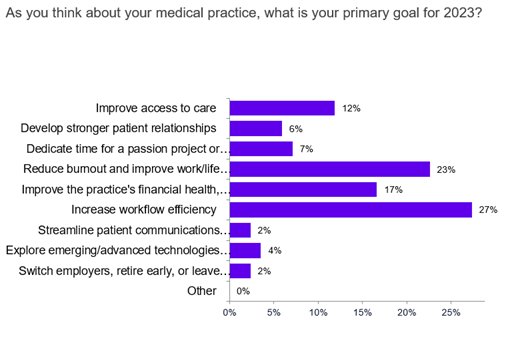Technology has transformed healthcare, particularly in the areas of medical documentation and common clinical tasks. With conversational AI, ambient AI, and generative AI, the industry has been propelled forward, enabling new functionalities and infusing healthcare experiences with intelligence. These advancements are contributing to improved patient care and enhanced clinician-patient experiences, making it possible to move away from inefficient processes.
Healthcare workflow inefficiencies waste time, increase cognitive load and burnout, and lead to job dissatisfaction. And their impact will only become more apparent as physician shortages grow, demand for healthcare services rises with the average age of the population, and clinicians are expected to accomplish more with limited resources.
It’s therefore crucial to address these underlying inefficiencies now, and optimize clinician workflows to improve the effectiveness of healthcare delivery.
AI can help. But before we explore how, let’s unpack the problem.
How workflow inefficiencies can impact the healthcare journey
Inefficient healthcare workflows can occur in outpatient management, billing, appointment management, approvals, consultations, or any other part of the healthcare journey. In every instance, they have a negative impact on clinicians, patients, and healthcare organizations.
Patients experience long wait times for appointments, and their care is impacted by inaccurate or missing information in electronic health records (EHRs). Clinicians become frustrated, burned out, and leave their jobs, while insurance payment denials and delays create cash flow problems.
In a recent Sermo survey, increasing workflow efficiency was cited as the top goal for physicians, closely followed by improving work/life balance.1 This isn’t surprising, given that Medscape’s burnout and depression report found bureaucratic tasks (60%), long working hours (34%), and a lack of control/autonomy over life (32%) are the top contributors to burnout.

And, it’s no surprise that “too many bureaucratic tasks” top Medscape’s list. Especially when you consider that for every hour of patient care, two hours are spent documenting it.
But it doesn’t have to be this way. Technology is transforming healthcare, particularly in the areas of medical documentation and common clinical tasks.
Solving workflow challenges with AI
Conversational AI, ambient AI, and generative AI have propelled the healthcare industry forward, enabling new functionalities and infusing healthcare experiences with intelligence. These advancements are contributing to improved patient care and enhanced clinician-patient experiences, making it possible to move away from inefficient processes.
Nuance and Microsoft have already put these technologies into practice, with clinical workflow efficiency solutions designed to aid clinicians and care teams.
Want to capture the full patient story automatically to reduce cognitive load and focus fully on patients? Want to have documentation created for you and save significant time so you can catch up on other tasks with time to spare after work? That’s exactly what Dragon Ambient eXperience (DAX) does. It securely records the clinician-patient conversation, automatically converts it into medical documentation, and delivers it into the electronic health record (EHR).
Want to place orders, navigate the EHR, and sign a note or make a referral—all with just your voice? That’s what Dragon Medical One does. It automates common tasks to save you time and help you operate more efficiently.
“I have busy clinic days, but when I leave the office, all my notes and orders are finished, and everything’s done for the day. If it weren’t for DAX, I would have left the profession—it’s kept me practicing.”
– Dr. Mihir Patel, Orthopedic Specialist, OrthoIndy.
“Dragon Medical One improves our clinicians’ efficiency by allowing them to create comprehensive, accurate notes simply by speaking. Our clinicians universally report high levels of satisfaction with Dragon Medical One, which allows them to provide the best care possible while helping to ensure their own wellbeing.”
– Dr. Haleem Mohammed, Regional Medical Director, Leon Medical Centers.
Industry-leading solutions from Nuance and Microsoft
There’s a reason why these proven AI solutions are consistently top ranking in their category. For three consecutive years, Dragon Medical One has ranked #1 Best in KLAS, while DAX has ranked #1 for improving clinician experience in KLAS’s top 20 emerging solutions.
These solutions deliver outcomes by addressing challenges in real-world clinical environments and, among other benefits, save clinicians on average over 50% of their time documenting care.
- Capture real-world medical conversations accurately and unobtrusively
- Understand accents, dialects, and different speaking styles
- Capture multi-party conversations such as a parent in the room with their child and the physician
- Know what belongs in a clinical note and what does not (e.g., chit chat)
- Correctly capture overlapping dialog
- Understand general and specialty-specific medical terminology
- Know the correct placement of content in the clinical note
- Utilize existing templates
DAX has been in the market for more than three years and is used by thousands of clinicians in hundreds of healthcare organizations of all sizes nationwide in ambulatory practices. Dragon Medical One is used by over 550,000 clinicians in over 12,000 healthcare organizations worldwide, in both inpatient and outpatient settings.
But crucially, whichever Dragon solution you use, you’ll find opportunities to reclaim time in your day to spend elsewhere—whether it’s with patients or in your personal life.
So, what will you do with your free time once you take full advantage of Dragon to improve workflow efficiency? See more patients? Spend more time with family and friends? Enjoy more leisure time?
If you’re like most Dragon users, you’ll do all of these and more, and find greater joy in practicing medicine.







